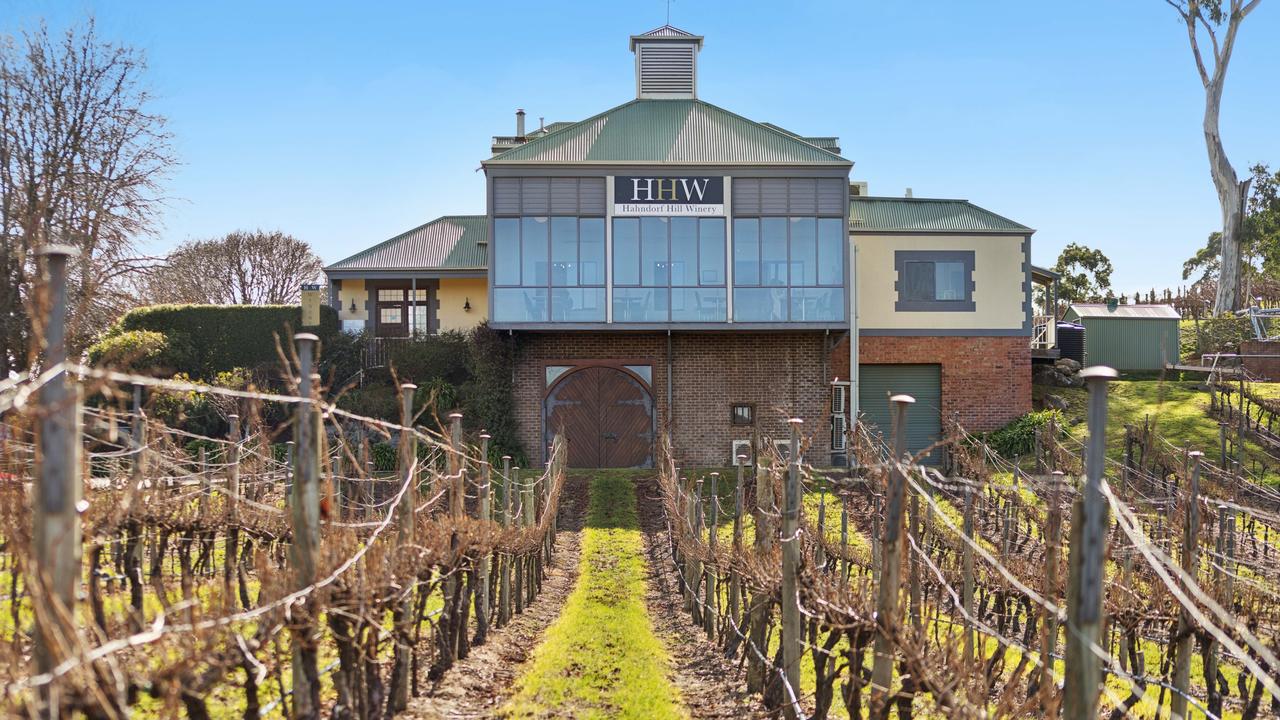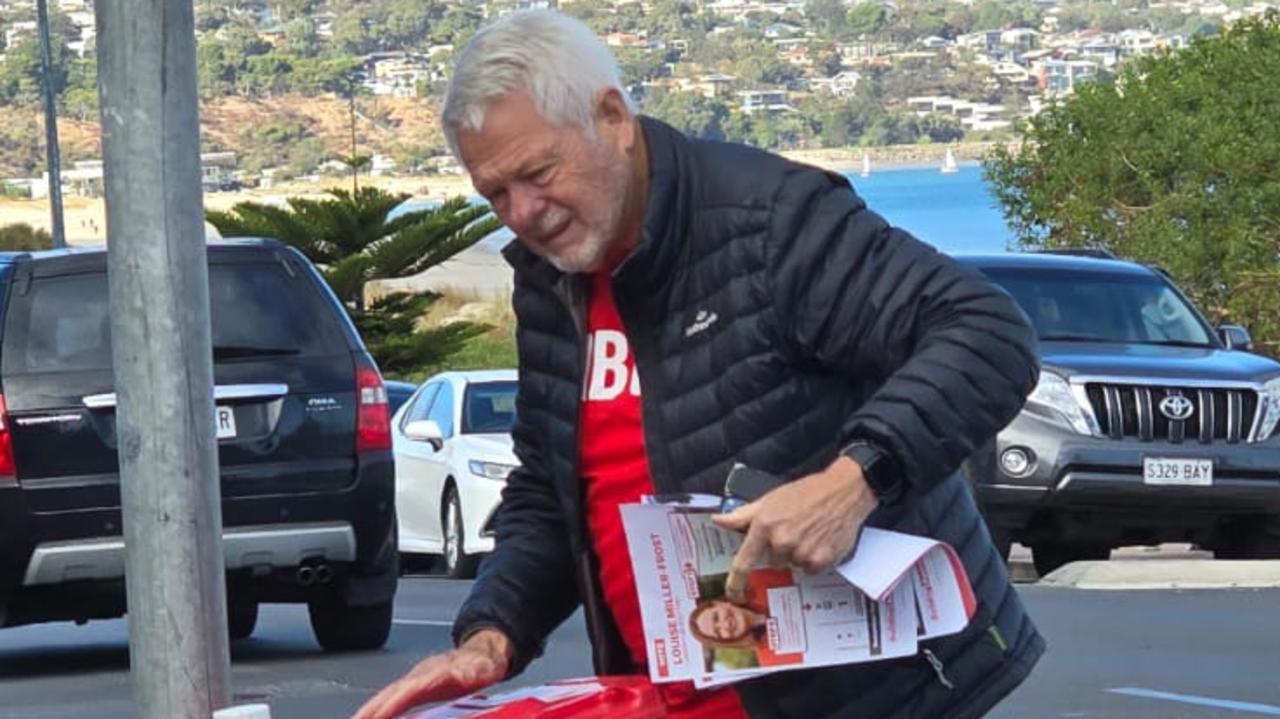Inside the double lives of SA band West Thebarton and their new album Mongrel Australia
They’re one of Adelaide’s biggest local music exports – but nine to five, rockers West Thebarton work just like anyone else. Here’s why they wouldn’t have it any other way.
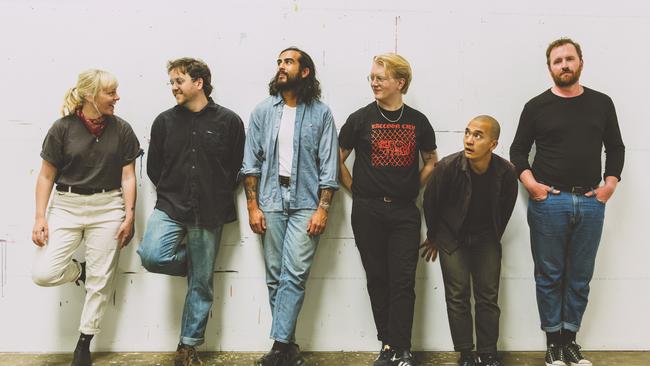
SA News
Don't miss out on the headlines from SA News. Followed categories will be added to My News.
On any given Monday at Adelaide Airport, you’ll find hordes of bleary-eyed business-suited travellers stepping fresh off the red-eye into their corporate week.
Ray “the Reverend” Dalfsen – a former radiation oncology clinician who now helps design products to treat people with cancer – is one of those commuters.
But instead of briefcases and garment bags, Dalfsen is flanked by instruments, band gear and five other sunglass-clad musos.
Just like the rest of his travelling party, 34-year-old Dalfsen, lead vocalist of Adelaide-based outfit West Thebarton, leads a double life: nine-to-fiver by day, rock star by night.
Formerly known as West Thebarton Brothel Party before a tasteful rebrand in 2017, the band released their first studio record, Different Beings Being Different, in 2018, to critical acclaim – including an ARIA nomination for best hard rock/heavy metal album.
The raucous band’s meteoric rise in Australia’s pub rock scene came as somewhat of a revival for the genre, ascending the charts alongside fellow South Australians Bad//Dreems.
In 2018, there were only seven weekends where the band didn’t play a show.
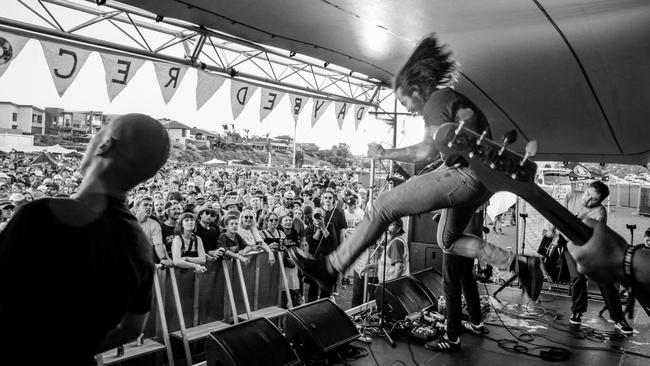
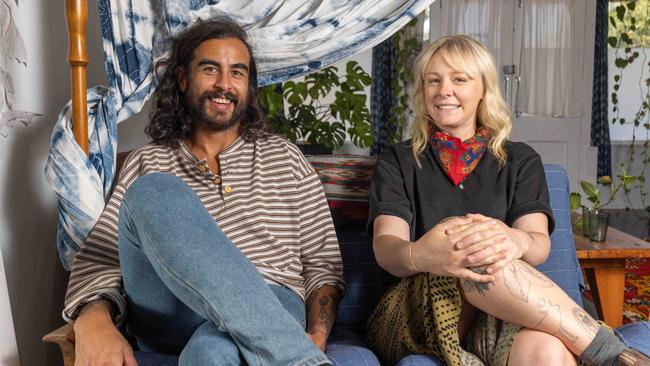
“I was flying in from Melbourne and starting work on the Monday morning, then by Friday you’d be like: ‘Hey, I need to leave at 4.30 today’, because you’d be waiting at the back of the office for an Uber to the airport for your next show,” Dalfsen says.
“I think I just got an addiction to living a super busy life.”
Super busy they are.
Drummer Caitlin Thomas, 34, is an award-winning tattoo artist by day (known to her devoted social media following as LucidLines) – and it’s in her eastern suburbs-based studio that she and Dalfsen sit down during their lunch break to take promo shots for the band’s long-awaited new album, Mongrel Australia.
It’s a record more than six years in the making. The years sinceDifferent Beings Being Differenthave been marked by intense personal life changes for its six members: parenthood, love, loss, moves interstate, moves overseas and a Covid-19 pandemic.
“We started writing this album just when we released the last album, so it sounds like a long time ago … but we’ll take three years of that out for the pandemic as a bit of an adjustment,” Dalfsen says.
“But we were touring a lot and hanging around each other a lot, which is where most of the ideas for this album came up. It’s really about our shared lived experience, but also about how much life has changed since we wrote the first one.”
A degree of pathos has crept its way intoMongrel Australia – the sound of a group that has not only played together, but grown alongside each other.
There’s plenty of variety in the offering, with love songs like Slow sitting alongside riff-heavy tales of grief like Neck Pains.
With seven in the band during recording, it’s easy to imagine a few heads butted during the creative process – but not for West Thebarton, Thomas says.
After a few comings-and-goings of members in its early years, she joined the group in 2017 after former drummer Alex Christophel made the move to Sydney.
Since then, West Thebarton’s rock star line-up has comprised guitarists Josh Healey, Tom Gordon and Josh Battersby, percussionist and guitarist Brian Bolado, bass player Nick Horvat, Thomas and Dalfsen.
The result is a melting pot of musical influences – the magic formula for the band’s signature sound.
But with the added maturity that comes with the band being six years older and wiser, it’s easy to argue the new album’s sonic depth has pushed West Thebarton beyond the pub-rock label. “Generally people come to the band with a song they have written and will present it to the others, like introducing someone to your parents for the first time,” Thomas says.
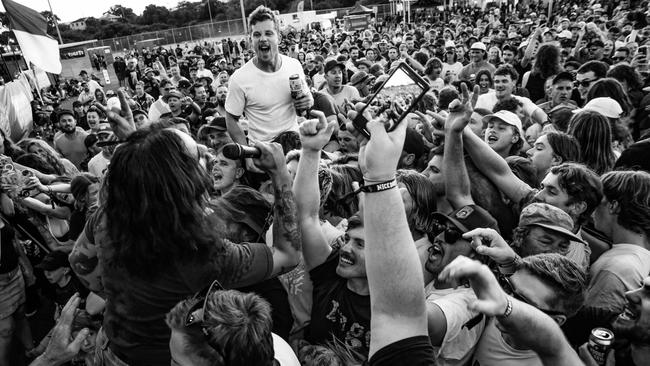
“We’ve got this really good dynamic where everyone just sort of listens to the bare bones of things and adds their own flair to it, which kind of blends into the signature West Theb sound.
“(Guitarist) Josh Healy listens to a lot more heavy music, but when his songs come to us that heavy sound gets stripped right back like a sand blaster until it sounds like a West Theb track.” And while it’s rare to see an Adelaide name-check in the catalogues of SA’s big-name musical exports, West Thebarton is loud and proud about their home town.
Look through their discography and you’ll find Live at The Exeter – a reminder of where the band cut their teeth and a far cry from the festival stages they’ve since graced as top-billed rockers. Their best-known hit, Moving Out, is a love letter to the western suburbs inspired by Ray’s frustrations at popular Adelaide bands “pissing off to Melbourne or Sydney” when they got big.
It’s that commitment to staying SA-great that has led the band to where it is today. For each member, the rock‘n’roll touring life is only a part-time gig. The rest of their days are filled with friends, family and the routine of everyday life. Both guitarist Bolado and bass player Horvat are lawyers by former trade, who went back to uni to study graphic design and architecture respectively.
Battersby – who will play with the band for the last time on Mongrel Australia – is a marine biologist and also in local heavy rock outfit Horror My Friend with Gordon, while Healey works at the Red Cross, manages other bands and plays with Sleep Talk. Only two people in Dalfsen’s global organisation know about his rock star double life, he says – and he’s happy to keep it that way.
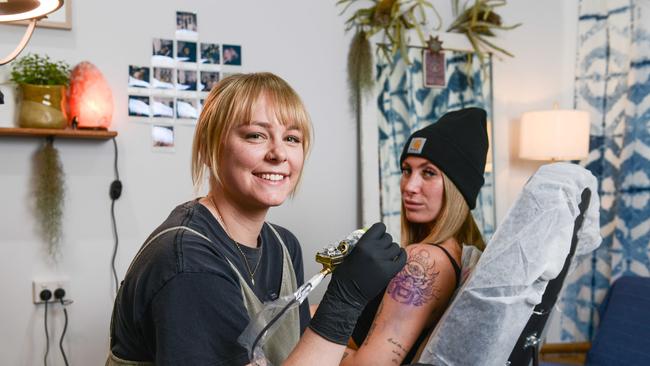
The 34 year old is so keen on keeping his worlds apart that he’s even hesitant to share his employer’s name.
“You have to almost live a separate life,” Dalfsen says.
“When you hang out with people outside the music industry you go: ‘Okay, I have to switch gear here – I can’t be the guy who just talks about music all the time or people are going to leave.’
“I actually think we have a healthy boundary with that compared to other musicians,” Thomas says. “I think if you’re super, super immersed in it then it actually gets quite draining and it can be too much of a good thing.
“I feel like by separating our normal lives and our music a bit, it keeps us healthier and gives us more energy to actually contribute to the band. If it becomes your full time job then it’s just …”
“Not fun,” Dalfsen finishes.
“When we go on tour, we’re just having fun. It’s not like any of us are going: ‘Oh we can’t wait to go on tour and make heaps of money!’, because that’s definitely not the case. When we tour, we just go: ‘How much fun can we have?’
“I don’t want to blur that line between pleasure and work, otherwise what do I actually do for fun?”
But the pair admits it’s not just about keeping joy in the music. The financial realities of touring and selling music in a post-Covid, social-media driven world mean bands like West Thebarton find themselves toeing the line between full-time rocking and paying their bills.
In 2014, a report by the Australian Council of the Arts found the average annual income for full-time musicians was $45,000 – a figure further diminished by the pandemic.
“For me personally, financially, it’s not really an option not to do it (work),” Thomas says.
“We’re in this weird state where we’re successful enough as a band that we are busy – which is something we’re all really grateful for – but at the same time it puts us in this category of still not earning enough money to support our lives, so you have to kind of juggle both.”
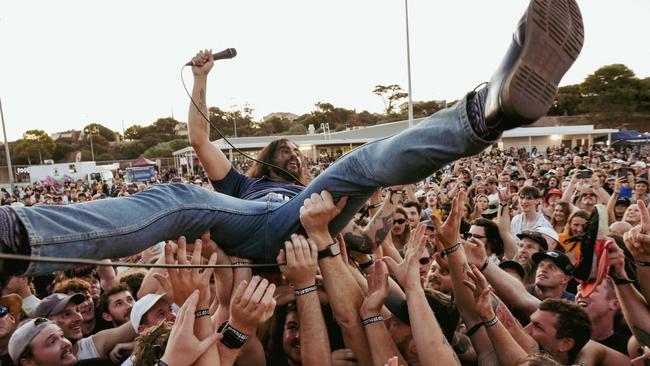
In 2018, Grizzly Bear frontman Ed Droste lashed the Australian music industry in a series of since-deleted social media posts, saying his band was “literally losing money” as the industry’s evolution pushed mid-tier bands off the airwaves.
Fast forward to 2024, and little has changed.
Inflation, the pandemic and flailing ticket sales have hit some of the nation’s biggest festivals and fewer smaller bands are choosing to take the risk on Aussie tours.
In 2023 alone, Falls Festival, ValleyWays, Coastal Jam, Vintage Vibes and Tasmania’s iconic Dark Mofo all announced cancellations or “pauses”.
“I’ve been to all those festivals as a punter and then played them, which is awesome – you’ve got such a connection to these festivals,” Dalfsen says.
“But all these things are falling down, it makes it seem like the landscape is changing. I don’t think it’s really too controversial an opinion to say if you don’t sell tickets to something, you can’t put it on.”
Aside from the cost of living crisis, industry insiders have been quick to point the finger at the rise of platforms such as TikTok for pigeonholing the popularity of music to certain artists or genres. Social media has become an essential tool for artists in promoting their music, with some record labels even hiring influencers to help songs take off on the viral video platform.
“There’s a very diverse community now of so many different genres and styles and avenues of how to reach fans,” Thomas says. “With the internet, TikTok, Instagram … there’s so much going on. The market is so oversaturated that everybody has such a broad spectrum of what they’re interested in now, whereas I think when we were younger, whatever was on the radio was what you were listening to.
“We 100 per cent feel that pressure (to use social media), but we’re also not going to do something that doesn’t feel authentic for us.
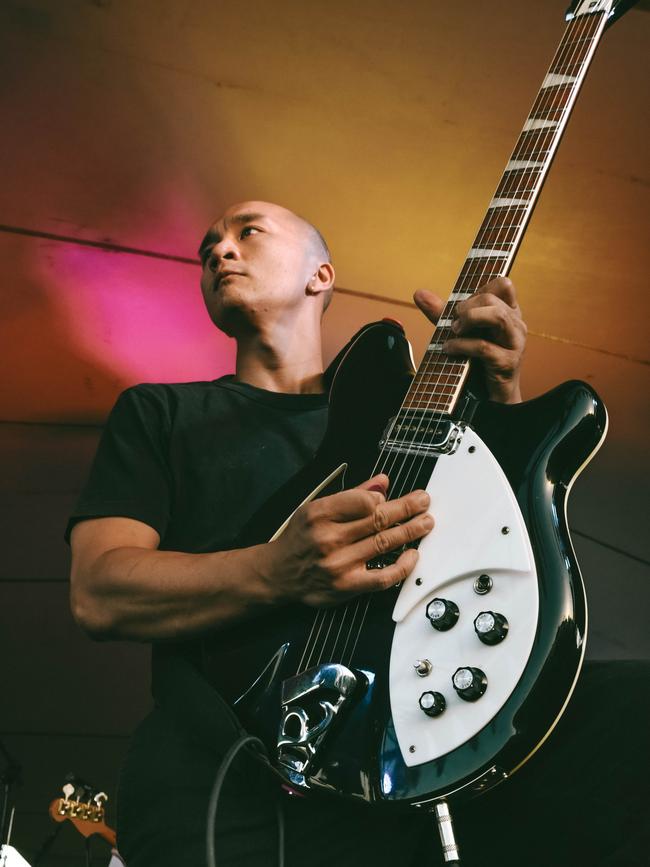
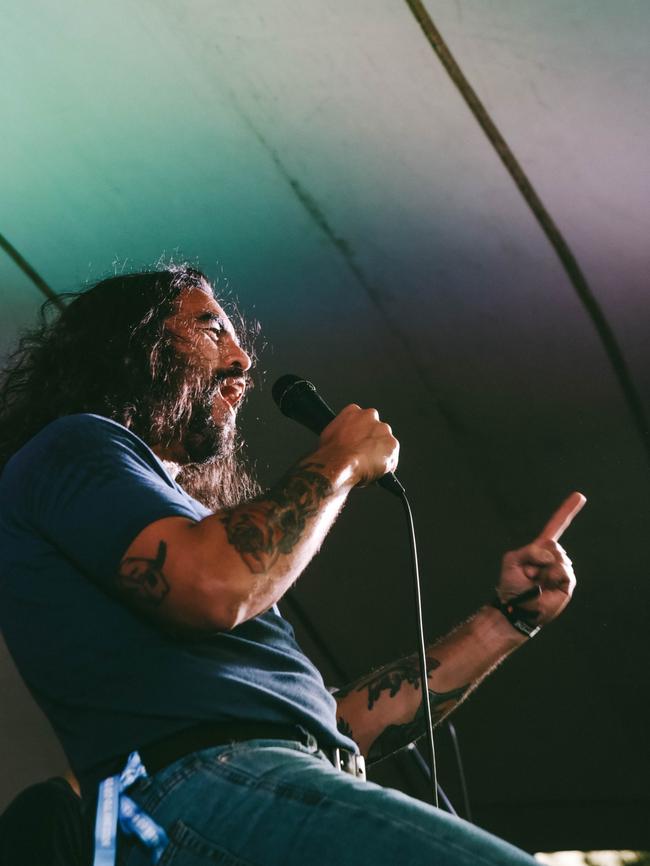
“My tattooing career relies on social media, so I feel like I have to be a part of that world whether I want to or not. In this day and age, in order to be successful you have to pretend to be that arrogant and broadcast every little thing you’re doing. You just have to find that energy and force yourself to do it, even if I don’t always feel like it aligns with my values.
“It’s this whole other job that people don’t yet really acknowledge is a big part of your day. You have to show your hunger for success, and that’s not very rock star.”
“It takes away the mystery – it’s like, do you really want to know what your favourite band’s singer’s favourite food is? – but a lot of fans do,” Dalfsen adds. Despite the changing landscape, the band is pragmatic about the future of the industry – a hopefulness that ripples through the upcoming record.
“It can be seen as a bit of a chore doing social media stuff but I’m sure that, if you were a band in the ’90s, you’d see it as a chore having to stand out the front of the gig and hand out pamphlets,” Dalfsen says.
“It’s just another method to get to people. I’m sure that social media won’t be the last iteration of that and I’m sure that a band in 10 years’ time will be saying: ‘I wish we could just do social media.’”
“Times are changing, generations are coming up, different approaches to things are coming up … it’s pretty natural for things to evolve and change,” Thomas says.
Unless it’s a full AI band,” Dalfsen adds with a laugh. “If they ever start doing AI music when it’s blurring the lines where you have to ask: ‘Is this an actual band?’, then I’m tapping out.”
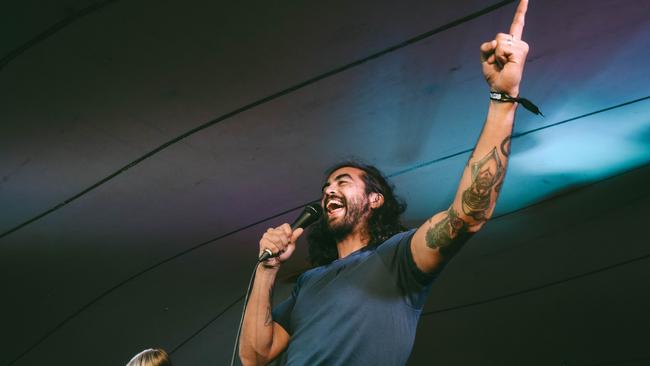
There’s little danger of West Thebarton resorting to computer-generated entertainment – the real thing has too much fun. Even with six years between album drinks, the band remains as good mates as ever.
“The best and worst thing about playing with your mates is that when one person’s got an idea, if other people are in this same mood, it just becomes a cycle,” Dalfsen says.
“The other week I was like: ‘Let’s write a country song’, and then that evolved to: ‘Should we just start a new band and write country songs? And then go out on stage and open for West Theb? And then we’ll change our names and move to Tamworth?’ Honestly, it’s all about just having a good time and having fun. I like to think we’ve got it sorted – otherwise this thing would have ended years ago.”
West Thebarton currently has four tour dates booked for Mongrel Australia’s release, kicking off on home soil at western suburbs live music haven The Gov in Hindmarsh on June 21, before hitting Melbourne, Brisbane and Sydney.
For the band, bringing new music to the stage has been a long time coming. But as Dalfsen reveals, with ideas already in the pipeline for their third record, it’s clear the West Thebarton rollercoaster won’t be ending any time soon. “We get to do something not a lot of people get to do. That’s why we’ve done it for so long. It’s not a chore, it’s something we love,” he says.
Originally published as Inside the double lives of SA band West Thebarton and their new album Mongrel Australia




